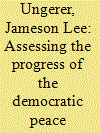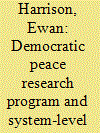| Srl | Item |
| 1 |
ID:
111969


|
|
|
|
|
| Publication |
2012.
|
| Summary/Abstract |
This article analyzes the evolution of the democratic peace, beginning from the initial observation of a lack of wars and rarity of conflicts between democratic regimes to a number of competing and/or compatible explanations over the causality of the observed peace. A Lakatosian methodology is applied as a foundation for assessing the progress of the research program, according to the four traditionally recognized concepts: a hard core; a positive heuristic; a negative heuristic; and the auxiliary hypotheses. Theories are distinguished based on their theoretical and empirical progressiveness, as well as progressive intra-program problem-shifts. Explanations over the active causal process have often been seen as competitors, yet a Lakatosian framework enables seemingly inconsistent hypotheses to be grafted onto an existing research program, which can be determined to be progressive if they provide increased explanatory power and novel predictions that receive empirical corroboration. By these criteria, the research on capitalist development and the ongoing democratic peace research are not incompatible, provided that further additions to the research program ascertain the progressive criteria. Furthermore, by highlighting the areas that can best explain and predict the democratic peace phenomenon, the Lakatosian analysis offers insights for future progression in the field, as well as the areas upon which research should be focused.
|
|
|
|
|
|
|
|
|
|
|
|
|
|
|
|
| 2 |
ID:
094693


|
|
|
|
|
| Publication |
2010.
|
| Summary/Abstract |
In a path-breaking article, Wade Huntley reinterpreted Kant's pacific union as a systemic phenomenon. This generated a new wave of inquiry into the evolutionary expansion of the democratic peace. The resulting literature examines how the effects of the pacific union vary over time and with the strength of the global democratic community. It investigates the possibility that the democratic zone of peace may spread through spillover effects, socialization dynamics, and positive feedback. In so doing, it has moved democratic peace research beyond the 'separate peace' formulation. Currently, however, this literature has accumulated insights on an ad hoc basis. New hypotheses have been developed and tested without systematically considering how these insights contribute to established knowledge about the democratic peace. This article uses philosophy of science criteria to assess the contributions of the systemic democratic peace literature. It shows how systemic analysis of the democratic peace is progressive in terms of Lakatos's methodology of scientific research programs. The article first considers how Lakatosian methodology has been applied to dyadic democratic peace research. Next, it refines this account of the democratic peace research program to make it more suitable for evaluating the contributions of the systemic literature. The last section shows systemic analysis is compatible with the Lakatosian vision of a cumulative series of theories (monadic-dyadic-systemic) building logically from a core assumption. It then uses the established structure of dyadic inquiry to frame a wide-ranging agenda for a second generation of democratic peace studies.
|
|
|
|
|
|
|
|
|
|
|
|
|
|
|
|